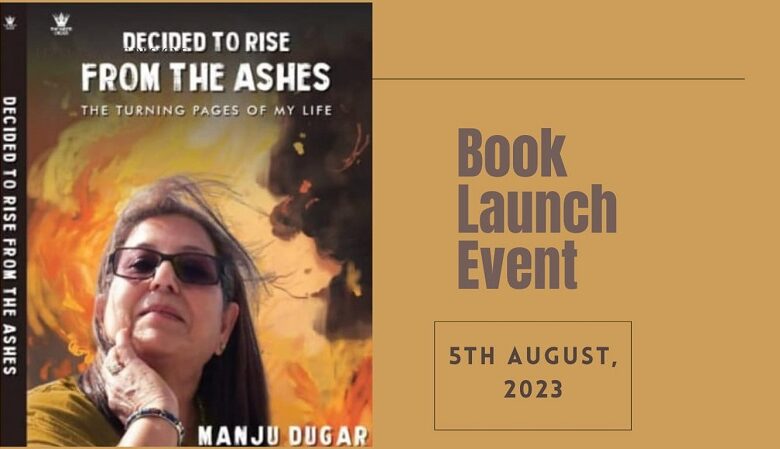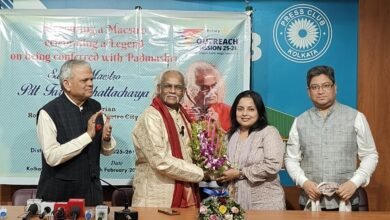Life’s Second Chance: A Testament of the Human Spirit

By: Urvi Teresa Gomes
Kolkata: In the vast tapestry of existence, where lives are woven with threads of time and memory, there exists a pursuit both noble and treacherous: the act of writing one’s own autobiography. To embark upon this odyssey is to journey into the depths of the self, traversing the labyrinths of memory, emotion, and reflection. Yet, as noble as it may be, the endeavour is fraught with perils— its hardships akin to the jagged cliffs that punctuate a traveller’s path.
On the 5th of August, 2023, the Spring Club caught the Book Launch of ‘Decided to Rise from the Ashes (The Turning Pages of My Life) by Smt. Manju Dugar, which consists of 263 pages and has been published by The Write Order. The book is an autobiographical representation of Mrs. Dugar’s life. She has described herself as a person with a multifaceted life and after battling hard with her circumstances, she has achieved several milestones— her book is a testimony to that. She was nominated in 1978 to attend the WFBY Conference in Japan and is in the managerial committee of numerous schools such as Mahadevi Birla Girls High School, Kendriya Vidyalaya (Salt Lake), Birla Vidya Mandir (Nainital). She was also nominated as an Executive Member of the West Bengal Federation of United Nations Association wherein her proficiency pushed her into becoming the Secretary.
The Chief Guest of the event was Professor Suranjan Das (Vice-Chancellor of Adamas University). Honourable luminaries present included Shri Ashok Vishwanathan (Film Director, Producer, Actor & Professor at Satyajit Ray Film & Television Institute), Shri Gautam Ghose (Film Director, Actor & Cinematographer), Shri Ramesh Prasad Singh (Former IG and IPS), Smt. V. Khamo (DIG CISF), Shri Bishambhar Newar (Chief Editor of Chhapte Chhapte & Taaza TV), and Shri Ashok Ghosh (Former IAS). The event included words of admiration from all of the aforementioned guests, Shri Abhyuday Dugar (Mrs. Dugar’s son) and Manju Ji herself, and the launch of her book ensued. The author shared intimate stories of her life, and what inspired her into penning down her life. The programme concluded with the author’s vote of thanks, followed by high tea.
Shri Ashok Vishwanathan introduced Mrs. Manju Dugar as someone who is “able to be multifarious”: what we call in Bengali a ‘Sabyasachi’. What is interesting is that life has never been a bed of roses for her, and there have been several crests and troughs, and moments in which she has questioned the very nature of existence but emerged as a phoenix— this book is a chronicle of her life. “It is so interestingly written. So when she feels the trepidation of going abroad for the first time,” said Mr. Vishwanathan, “she writes about it . . . she even describes the route that she takes . . . she has made a film (Mrs. Dugar is the scriptwriter of the short film ‘Khanta’), she has been writing all the while— very lucid, clear English.” He concluded by reminding the audience: “this book is a must-read, it’s an unconventional book… unless you read the book, you will not be able to grasp its essence . . . it is a book in which her experiences have been placed in a very gentle manner . . . she hasn’t bothered to stick to . . . down moments. [ . . . ] And she is very humble in the way she expresses herself despite all the achievements.”
An autobiography— imagine gazing upon a mirror, not to see your physical visage, but to peer into the landscape of your soul. The mirror of self-reflection, as it reflects not the external, but the tangled corridors of one’s experiences. Assembling these fragments into a coherent narrative requires a soul-stirring excavation of the past, a voyage into the depths where forgotten echoes of laughter and tears linger; it is here that the author confronts with forgotten pain and suppressed sorrow. The past is a gallery of moments, some painted in vibrant hues of joy, others daubed with sombre strokes of pain. The very act of transcribing memories onto paper transforms them. Words, like alchemical agents, transmute emotions into ink, infusing pages with laughter, tears, and the quiet rustling of regrets. “Without the fear of darkness in life,” says Manju Ji, “always think for the people who are in worse situations than you. This will give you the courage to live for those who are dependent on you.”
It is not the perfection of a narrative that matters, nor the artistry of the prose alone. It is the courage to embark upon this journey, to traverse the shadowed valleys and sunlit peaks of memory, and to emerge on the other side, not merely as an author of a story, but as a seeker of truth. For in the hardships of writing one’s own autobiography, a profound connection is forged between past and present, author and reader, heart and mind. In the end, the hardships become a pilgrimage, a sacred trek through the soul’s terrain. They illuminate the resilience of the human spirit, the intricate beauty of individual narratives, and the eternal quest to make sense of the enigma of existence. Manju Dugar’s book is an instance of the indomitable spirit of humans— of women, and illustrates the fact that no matter how many adversities life throws at us, we can always “rise from the ashes”.






